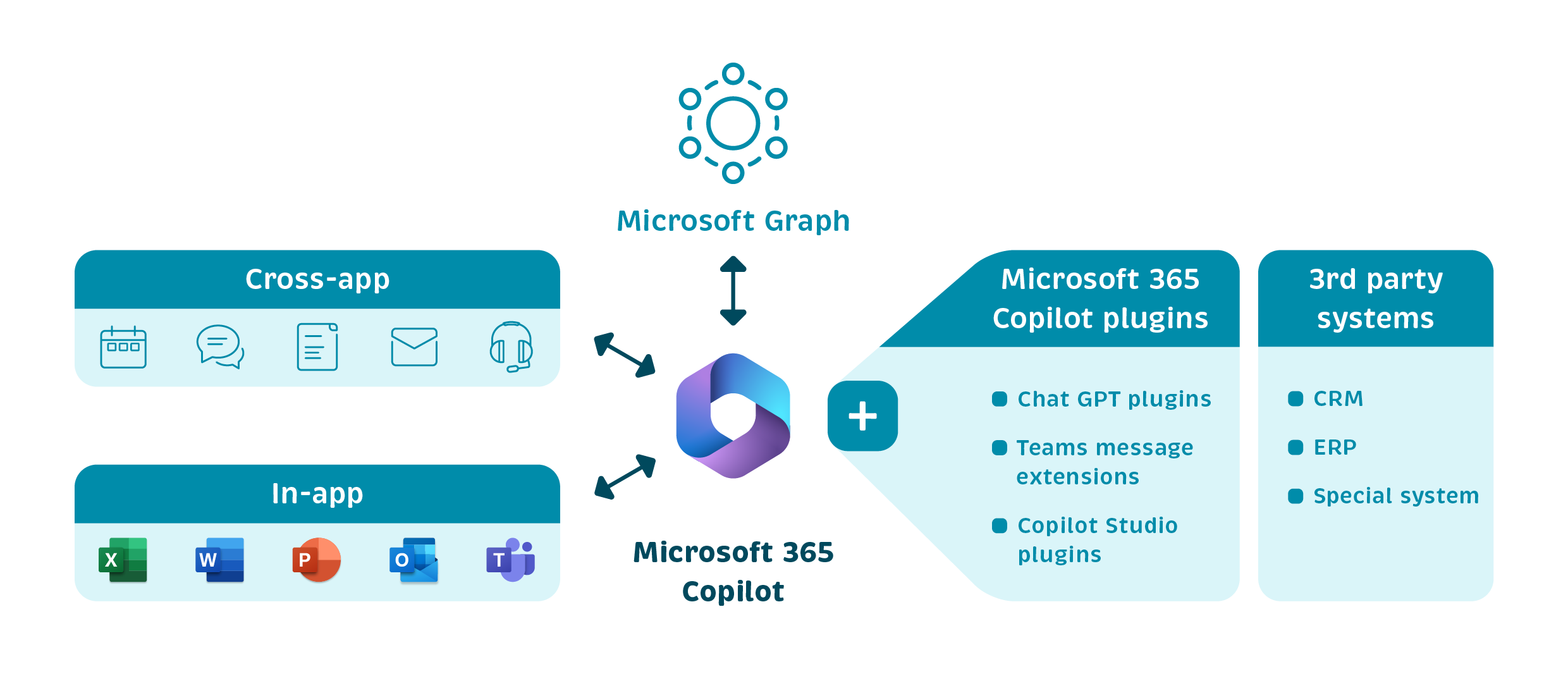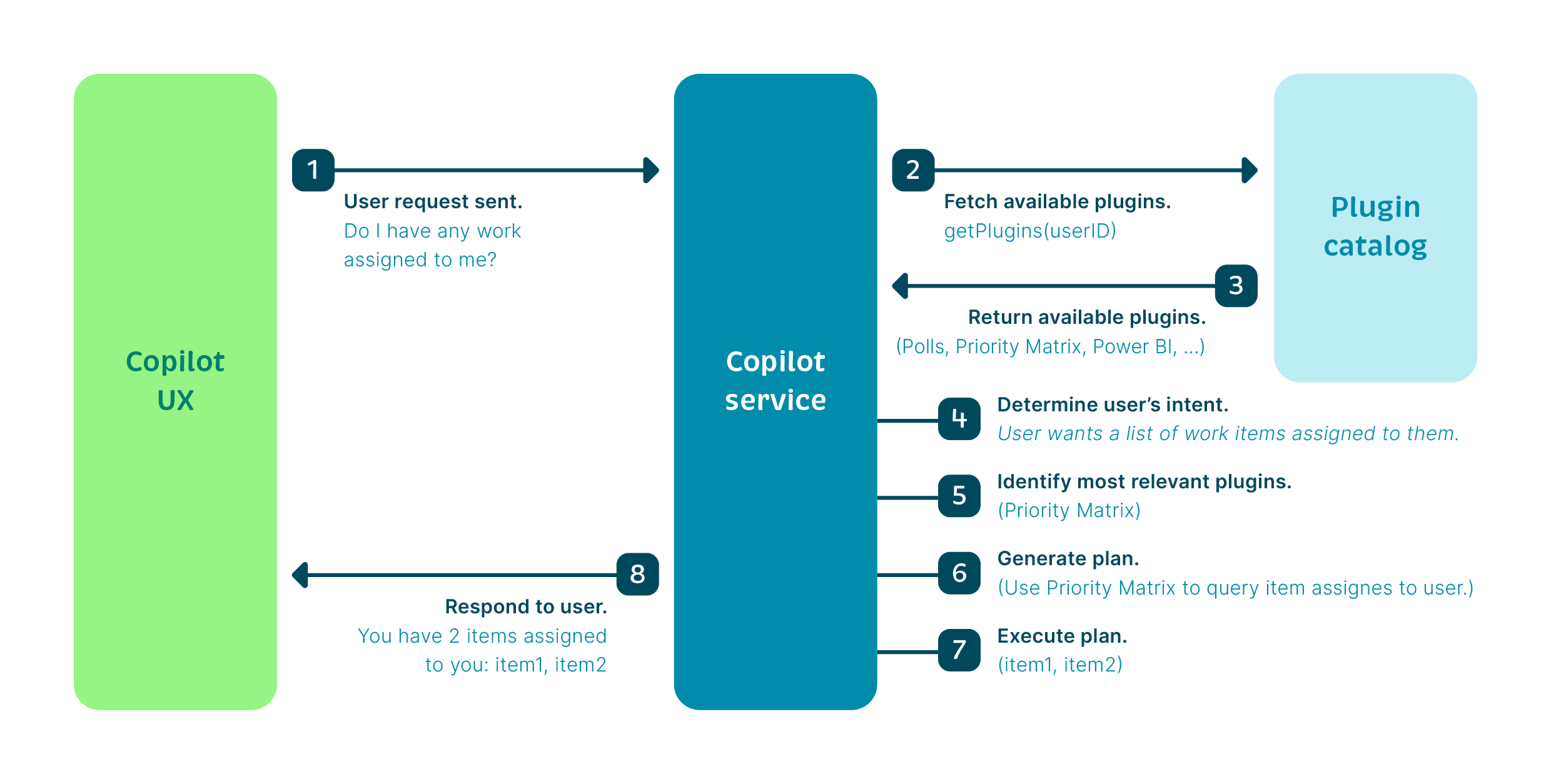But how much time do they end up spending looking for the information they need? Too much.
According to various studies and surveys, employees lose valuable time searching for data and documents. One Haufe study showed that four out of five employees spend as much as half an hour a day on cumbersome research. A report by McKinsey estimated that employees spend nearly two hours each day searching for and gathering information.
These figures show that there is a great need for more efficient and smarter solutions for procuring information. After all, every minute spent looking for information is one less minute that is available for the actual tasks that create value and drive innovation. So how can companies improve and accelerate the search for information in the workplace?
AI as game changer?
M365 Copilot is an intelligent assistant that is part of the modern workplace offered by Microsoft (M365). It analyzes data, identifies patterns and trends, and can suggest appropriate actions. Typical scenarios where Copilot is used can include:
- boosting user productivity by allocating tasks optimally and supporting the setting of priorities.
- improving communication by addressing the right people. It also helps to increase creativity when drafting letters and other forms of communication by making it easier to generate new ideas, create inspiring content, and find innovative solutions.
However, business-critical data in particular is often stored not in M365 (especially not in a well-organized fashion), but in specialized applications such as Salesforce or SAP. The answers that Copilot can provide by default are therefore focused mainly on self-organization and collaboration, as these data are accessible to Copilot in M365.
This means that Copilot’s search scope is not broad enough to support employees efficiently in their daily work, especially when it comes to making business-critical decisions. BUT...
Extending Copilot to other systems
... Copilot does make it possible to make proprietary applications smarter by allowing for easy generation of suggestions for file content, for example. The platform also permits third-party systems to be linked with Copilot – in the default form of M365 Copilot, Copilot works only on data present in Microsoft graphs (e-mails, calendar entries, electronic files, etc.). Extensions known as plugins can now be used to enable the assistance system to provide answers based on the “knowledge” present in these third-party systems as well. When a user submits a query, for example, the plugins allow Copilot to search through a connected CRM system, provided that the question relates to the company’s customer base.

1 Description
There are three ways to expand the system’s search scope in M365 Copilot. First, the message extension makes it possible to link Copilot bots to any conversation to answer questions, share information, or perform actions. The ChatGPT plugin uses AI to generate natural and fluent dialog geared toward the context and users’ intentions. Copilot Studio is an integrated development environment that people can use to create and adapt their own Copilot bots, even as low-code developers.

Teams message extensions offer the farthest-reaching ways to integrate third-party systems and Copilot. They are currently already in use for seamless integration of third-party solutions within Microsoft Teams. These extension options allow to seamlessly integrate data from third-party sources into Copilot. Based on these data, various Copilot use cases are enriched by adding the necessary data, regardless of the source.
2 Sample use cases
Extending Copilot puts a range of additional use cases within reach.
At Campana & Schott, we are currently working with our customers on various Copilot extensions that significantly enhance employee efficiency.
2.1 Incorporation into a specialist system (AI models)
For one customer in the pharmaceuticals sector, Campana & Schott has developed a tool based on Power Platform to document the many models used by this company (AI, ML, and more) simply and make them easier to find. Integration into MS Teams via Copilot allows scientists and researchers to easily search the company’s “model store” for AI models in natural language and find models that meet certain criteria. Then, the data can be used for further tasks in Copilot. For example, a draft of a meeting invitation for the team can be created with information on the AI models, or a summary of the various AI models can be created.
2.2 Extension to a process application
At many organizations, processes need to be documented using checklists, in some cases because this is legally required. To serve this aim, Campana & Schott implemented a solution based on Power Platform for one of its customers to digitally visualize checklists for these processes. The integration with Copilot makes it possible to search for various checklists by use case without having to integrate an overview into the app from scratch. Users can request the relevant information at any time, and actions can be carried out based on these options. If a checklist has been paused for a longer period, a meeting can be organized with the colleagues responsible.
2.3 Integration of CRM data
A link between Copilot and the existing CRM system lets employees easily create letters with support based on CRM master data. They can also interact verbally with the data in the system. For example, they can ask things like, “Which of our customers have the highest expected revenue and the longest open processing time?” This kind of information makes it easy for sales employees to decide where to focus their customer relations efforts and set up a meeting with the relevant project team right away.
2.4 Project management
Much like in the CS PPM Power Suite developed by Campana & Schott, integrating Copilot and its functions into a project management solution gives users support options when formulating risks within the project or describing the project as part of the project charter. The goal is to significantly improve data quality by doing this. Entries are simplified, and inexperienced users receive support in formulating typical risks in a project type.
3 Data privacy & security
Search queries are sent to third-party data sources via plugins, and the response from Copilot is then provided to the user in natural language. If the access is performed on the user’s behalf, the only output returned is data sets to which the users have access. The information is not copied to the Microsoft world, and the data remain in the source systems instead. In particular, the Copilot model is not trained at any time on Microsoft customers’ data.
Result & next steps
Integration with additional systems significantly broadens the range of scenarios where M365 Copilot can be used. This makes Copilot an assistance system that can support business-critical work, thereby also improving business-critical procedures. Campana & Schott has extended multiple applications to work with Copilot. The company is happy to provide support by consulting on the right use cases and implementation, right up to assisting with taking these solutions live via ACM measures. Comparable scenarios can also be implemented effectively via ChatGPT based on Azure OpenAI and then incorporated into the modern workplace in Teams.
If you are interested in a workshop to identify the first AI use cases, Campana & Schott has a suitable standardized workshop format for this


